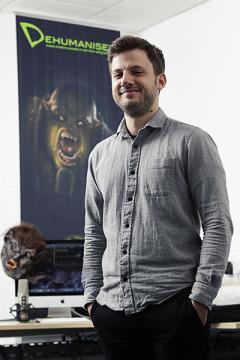Transforming ideas into enterprise
The University is helping record numbers of staff and students achieve commercial success with their research and innovation.

There is an enviable track record at Edinburgh of turning bright ideas into big business and the past 12 months have been no exception. In fact, they have seen the creation of a record number of companies by the University – a grand total of 44, of which 41 were start-ups and three spin-outs.
The breadth, diversity and innovative nature of research being conducted by the University means that it has practical applications throughout all walks of life – and in many cases that research has the capability to be turned into successful commercial enterprises.
This is largely thanks to the work of Edinburgh Research and Innovation (ERI) the specialist arm of the University that assists academics with what can be the challenging process of giving their expertise commercial appeal. And the service is not just for staff – students can also benefit from the backing of LAUNCH.ed, a University initiative that helps student entrepreneurs.
Record investment
As for the quality of the research and its relevance to the world of business, the figures speak for themselves, with investment in University-founded companies hitting a record high. A total of £237.4 million has been invested over the past year, demonstrating the impact that the company formation activities are generating.
One such success story is that of Krotos Ltd, set up by University of Edinburgh graduate Mr Orfeas Boteas. Orfeas studied for a Sound Design MSc in 2012, and managed to turn his final-year project into a commercial success in a very short space of time.
“My studies played a very important role,” says Orfeas. “I received very valuable advice from LAUNCH.ed which was crucial to the business. They also gave me the option to apply for a full-time internship with them, to work on commercialising my project over the summer, while providing business training as well.
“It was during this time that I incorporated Krotos Ltd and we released the commercial version of our product, Dehumaniser, in November 2013.”
Dehumaniser is sound-effect software for use in film, television and video games. It was recently used as the voice of the character Ultron in the movie Avengers: Age of Ultron.
“Usually, making imaginary creature sounds requires the recording and processing of various animal sounds or human voices, adding them in layers in order to create the wanted sound,” explains Orfeas. “This procedure needs hours for designing a single sound effect – and money to spend on expensive software and sound libraries.
“Our software allows the production of studio-quality monster and creature sounds, in real time using your voice. You basically scream into the microphone and you make the wanted sound. There is also an iOS app version of Dehumaniser for fun!”
For Orfeas the last year has been a significant one: “In 2014 I was awarded a University Research Fellowship by the Royal Society of Edinburgh. It was a life-changing experience that provides salary and business training for a year. The University is doing a great job supporting start-ups.”
Economic impact
Success stories like Krotos Ltd are not just good news for the University community, they’re also good news for the wider economy. The new companies have contributed more than £140 million to the Scottish economy and helped to create 2,300 jobs, according to the independent consultancy BiGGAR Economics.
The University’s Professor Harald Haas holds the Chair of Mobile Communications and is a pioneer of LiFi technology. He is also co-founder and Chief Scientific Officer of pureLiFi Ltd, as well as the Director of the University’s LiFi Research and Development Centre. He works on light-enabled internet technology. Professor Haas calls it “technology that can communicate as well as illuminate”.
Developed in the University’s School of Engineering, LiFi technology is currently being incorporated at the home of the Golden State Warriors basketball team in San Francisco and has been backed by the University’s venture investment arm, Old College Capital. At the TED Global 2015 conference, Professor Haas demonstrated how LiFi can be used with solar cells, which could have life-changing implications for communities without existing power infrastructures.
The initial support acted as a catalyst for what has become a massively successful company offering highly skilled jobs to 20 people.
“I have received tremendous support and encouragement from the University, both for my research and for taking forward my resulting innovations,” says Professor Haas. “ERI pointed me to the appropriate grants to apply for, and in addition, I received internal funding to build a first proof-of-concept demonstrator that led to LiFi, and subsequently to a larger project, and eventually to pureLiFi Ltd which has become the world leader in LiFi technologies.”
Professor Haas’ research group published the first proof-of-concept results demonstrating that it is possible to turn commercially available light emitting diode (LED) light bulbs into broadband wireless transmission systems. It is this kind of innovation, with backing from the University, that is now feeding back into the economy.
“The initial support was instrumental,” he reflects. “It acted as a catalyst for what has become a massively successful company offering highly skilled jobs to 20 people, and many more in the years to come.”
Since Edinburgh’s first recorded spin-out, Reynolds Medical, was established more than 40 years ago, the University has created more than 400 start-up and spin-out companies. If the visionary work of Krotos and pureLiFi Ltd are anything to go by, there will be many more in the years to come.

